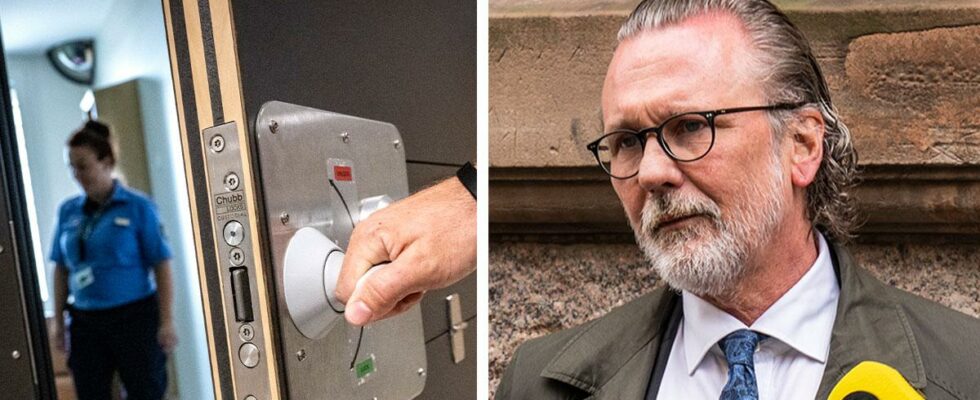UNSaveSpara
Ⓘ The summary is made with the support of AI tools from Openai and quality assured by Aftonbladet. Read our AI policy here.
Show more
Chevron-Down
Expand-Left
Fully screeding law Thomas Olsson criticizes the Swedish Prison Service’s routines. Photo: Pontus Orre
Aftonbladet previously talked about the snuff and clothing riot between detention guards and visiting police and lawyers.
The Prison Service is now changing its routines – but they still want lawyers to take off their clothes.
– I can’t see the situation where it is necessary for a lawyer to undo, says lawyer Thomas Olsson.
Last fall, lawyers strongly criticized the Prison Service’s increasingly harsher treatment when they were to meet their clients.
The Prison and Probation Service introduced, among other things, a ban on police and lawyers to bring their snuff boxes when they were to interrogate suspected criminals, something that both criminologist professor Leif GW Persson and Starvokat Thomas Olsson responded to.
– That a police officer would smuggle in drugs does not exist, it is completely bizarre. This snuff ban is symptomatic for a security thinking that has derailed, said lawyer Thomas Olsson then.
Expand-Left
The full-screen criminal care changes routines after the snuff and clothing fraction. Photo: Johan Nilsson/TT
Olsson with more lawyers also emerged and testified about how they were forced to undress in the underwear of nitic detention guards.
The Prison and Probation Service has now produced new routines for entry into detention, which has been developed in agreement with the Law Society.
Remove garments
It says that body visitation “takes place with staff of the same sex” and that they should “ask it to remove the current garment and place it in a box”.
– I can’t see the situation where it is necessary for a lawyer to undo. It is good that a priority order is determined which means that visitation and undressing are the last steps. Personally, I will not put it on it, but rather remove myself, says Thomas Olsson.
According to Olsson, the wording crosses the limit for what is acceptable for lawyers who are in custody in their professional role.
– It is not something that can be considered to be included in the job description for a defender. The fact that the Prison Service Bums considers it necessary to include that writing only shows the authority’s paranoid control of the business, he says.
Expand-Left
The full -screed -law community secretary general Mia Edwall Insulander agrees with Thomas Olsson – to some extent. Photo: Magnus Wennman
The Law Society’s Secretary General Mia Edwall Insulander agrees with Olsson, but believes that they have still come a long way.
– I agree with Thomas Olsson that it is completely unacceptable. What is positive about this is that lawyers can now point to something. We have had a positive dialogue with the Prison and Probation Service and think it is much clearer now, that there are different steps to go through. Dressing is something that will happen as absolutely the last resort, and we hope it never happens, she says.
Dangerous items
The Prison Service Head of Unit Joakim Righammar believes that the entry routines should not be seen as directed at lawyers, but they all apply to their own staff.
– It is to prevent dangerous objects, weapons so clearly, but also phones that we do not want to get. What we have done in this revision is that we said that we have the opportunity to do a lot, but not something that is not necessary. It will be a better process where we emphasize proportionality more, he says.
However, the snuff ban has not been reviewed in the new routines.
– It is determined locally and can look different, based on the local security situation and based on resources, says Righammar.
